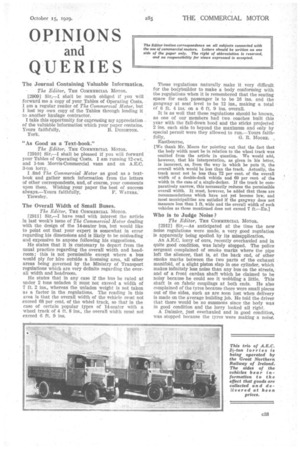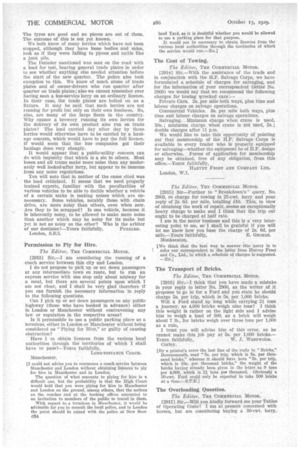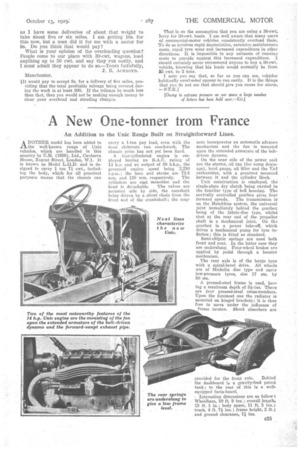OPINIONS
Page 71

Page 72

Page 73

If you've noticed an error in this article please click here to report it so we can fix it.
and
QUERIES
The Journal Containing Valuable Information.
The Editor, THE COMMERCIAL MOTOR. '
[29091 shall be much obliged if you will forward me a copy of your. Tables of Operating Costs. I am a regular redder of The Comrneretal Motor, but I lost my own copy of the Tables through lending it to V another haulage contractor.
I take this opportunity for expressing my appreciation of the Valuable information which your paper contains.
Yours faithfully, V B. DEIGHTON. York.
"As Good as a Text-book."
The Editor, THE COMMERCIAL MOTOR.
[2910] Sir,—I shall be pleased if you will forward• your Tables of Operating Costs. I am running 12-cwt. and 1-ton Morris-Commercial vans and an A.E.C. 3-ton lorry.
I find The Commercial Motor as good as a textbook and gather much information from the letters of other correspondents, and, of course, your comments upon them. Wishing your paper the best of success
always.—Yours faithfully, F. WATERS. Yiewsley.
The Overall Width of Small Buses.
The Editor, THE COMMERCIAL MOTOR.
129111 Sir,—I have read with interest the article In last week's issue of The Commercial Motor dealing with the design of the 14-seater bus, but would like to point out that your expert is somewhat in error regarding his dimensions and is likely to be misleading and expensive to anyone following his suggestions.
He states that it is customary to depart from the usual practice regarding the overall width and headroom ; this is not permissible except where a bus would ply for hire outside a licensing area, all other areas being governed by the Ministry of Transport regulations which are very definite regarding the overall width and headroom.
He states that in any case if the bus be rated at under 2 tons unladen it must not exceed a width of 7 ft. 2 ins., whereas the 'unladen weight Is not taken as a factor in the regulations. The reading in this area is that the overall width of the vehicle must net exceed 68 per cent. of the wheel track, so that in the case of certain popular types of 14-seater with a wheel track of 4 ft. 8 ins., the overall width must not exceed 6 ft. 9 ins.
These regulations naturally make it very difficult
for the bodybuilder to make a body conforming with the regulations when it is remembered that the seating space for each passenger is to be 16 ins. and the gangway at seat level to be 12 ins., making a total of 6 ft. 4 ins. on a 6 ft. 9 ins. overall.
It is as well that these regulations should be known, as one of our members had two coaches built this year with the fall-down hood and the sticks projected 2 ins, each side to beyond the maximum and only by special permit were they allowed to run.—Yours
G. II. Moonz. Eastbourne, [We thank Mr. Moore for pointing out that the fact that the body width must be in relation to the wheel track was omitted from the article in question. We would add, however, that his interpretation, as given in his letter, is incorrect, as, from the way in which he puts it, the overall width would be less than the track. Actually, the track must not be less than 72 per cent, of the overall width of a double-deck vehicle and 69 per cent. of the width in the case of a single-decker. If the track be comparatively narrow, this necessarily reduces the permissible overall width. It must, however, be added that these are recommendations which have not yet become law, and most municipalities are satisfied if the gangway does not measure less than 1 ft. wide and the overall width of such vehicles as those mentioned does not exceed 7 ft.—ED.] Who is to Judge Noise ?
The Editor, THE COM3IERCIAL MOTOR.
[2912] Sir,—As anticipated at the time the new noise regulations were made, a very good regulation is apparently being spoiled by its misapplication.
An A.E.C. lorry of ours, recently overhauled and in quite good condition, was lately stopped. The police sergeant complained of smoke marks where the pipe left the silencer, that is, at the back end, of other smoke marks between the two parts of the exhaust manifold, of a slight piston slap in one cylinder, which makes infinitely less noise than any bus on the streets, and of a front cardan shaft which he claimed to be noisy because he could see it wobbling a little. This shaft is on fabric couplings at both ends. He also complained of the tyres because there were small pieces out of the sides, such as are Soon lost when delivery is made on the average building job. He told the driver that there would be no summons since the body was in good condition and the lorry looked all right.
A Daimler, just overhauled and in good condition, was stopped because the tyres were making a noise.
The tyres are good and no pieces are out of them. The outcome of this is not yet known.
We both know of many lorries which have not been stopped, although they have loose bodies and sides, look as if they were falling to pleces and rattle like a junk pile.
The Daimler mentioned was sent on the road with a load for test, bearing general trade plates in order to _see whether anything else needed attention before the start of the new quarter. The police also took exception to this. We know of much abuse of trade plates and of owner-drivers who run quarter after quarter on trade plates; also we cannot remember ever having seen a bus-service lorry on an ordinary licence. In their case, the trade plates are bolted on as a fixture. It may be said that such lorries are not running for profit but only on their own business. So, also, are many of the large fleets in the country. Why cannot a brewery running its own lorries for the delivery of its own product also run on trade Plates? The load carried day after day by these lorries would otherwise have to be carried by a haulage concern, which would have to pay the full licence. . if would seem that the bus companies get their haulage done very cheaply.
It would_ appear that a public-utility concern can do with impunity that which is a sin in others. Most buses and all trains make more noise than any moderately well looked-after lorry, but appear to be immune from any noise regulations.
You will note that in neither of the cases cited was the load criticized. It seems that we need properly trained experts, familiar with the peculiarities of various vehicles to be able to decide whether a vehicle of a certain make is making noises which are unnecessary. Some vehicles, notably those with chain drive, are more noisy than others, even when .new. Are they to be scrapped? Is one vehicle, because it is inherently noisy, to be allowed to make more noise than another which may be noisy for its make but yet is not as noisy as the other? Who is the arbiter of our destinies?—Yours faithfully, PUZZLED.
. London, S.E.5.
Permission to Ply for Hire.
The Editor, THE COMMERCIAL MOTOR, [2913] Sir,—I am considering the running of a . coach service between this city and London.
I do not propose to pick up or set down passengers at any intermediate town en route, but to run an express service with one stop only about midway for a meal, but there are several points upon which I am not clear, and I shall be very glad therefore if you can furnish the necessary information in reply to the following questions.
Can I pick up or set down passengers on any public highway (those who have booked in advance) either in London or Manchester without contravening any law or regulation in the respective areas?
Is it permissible to use a public parking place as a terminus, either in London or Manchester without being considered as "Plying for Hire," or guilty of causing obstruction?
Have I to obtain licences from the various local authorities through the territories of which I shall have ' to pass?—Yours faithfully,
LONG-DISTANCE COACH.
Manchester.
[I could not advise you to commence a coach service between Manchester and London without obtaining licences to ply for hire in Manchester and in London.
The question of what amounts to plying for hire is a difficult one, but the probability is that the High Court would hold that you were plying for hire in Manchester and London on the ground, among others, that the notices on the coaches and at the booking offices amounted to an invitation to members of the public to travel in them.
• With regard to a terminus in Manchester, it would be advisable for you to consult the local police, and in London the point should be raised with the police at New Scot
land lard, as it Is doubtful whether you would be allowed to use a parking place for that purpose.
It would not be necessary to obtain licences from the• various local authorities through the territories of which the service would run.—En.] The Cost of Towing.
The Editor, THE COMMERCIAL MOTOR.
[2014] Sir,—With the assistance of the trade and in conjunction with the H.F. Salvage Corps, we have formulated a schedule of charges for salvaging, and for the information of your correspondent (letter No. 2903) we would say that we recommend the following charges for towing wrecked cars:— Private Cars. 2s. per mile both ways, plus time and labour charges on salvage operations.
Commercial Vehicles. 3s. per mile both ways, plus time and labour charges on salvage operations.
Salvaging. Minimum charge when crane is used, 10s.; minimum charge 'when crane is not used, 5s.; double charges after 31 p.m.
We would like to take this opportunity of pointing out that membership of the H.P: Salvage Corps is available to every trader who is properly equipped for salvaging—whether the equipment be of H.P. design or otherwise. Forms of application for membership may be obtained, free of any obligation, from this office.—Yours faithfully, HARVEY FROST AND COMPANY LTD. London, W.1.
The Editor, THE COMMERCIAL MOTOR.
[2015] Sir—Further to " Breakdown's " query, No. 2903, re charge for towing in 25-cwt. lorry and your reply of 2s. 6d. per mile, totalling f.10. This, in view of obtaining the work of repair, seems an exceptionally heavy charge to make and I think that the trip out ought to be charged at half rate.
I am in the motor business and this is a very interesting point to me, so I shall be grateful if you will let me know how you base the charge of 2s. 6d. per
mile.—Yours faithfully, E. CcaottoE. Monkseaton.
[We think that the best way to answer this query is to refer our correspondent to the letter from Harvey Frost and Co., Ltd., in which a schedule of charges is suggested. —ED.] The Transport of Bricks.
The Editor, THE COMMERCIAL MOTOR.
[2910] Sir,—I think that you have made a mistake in your reply to letter No. 2900, as the Writer of it proposes to go in for a Ford and you state he should charge 5s, per trip, which is 5s. per 1,000 bricks.
Will a Ford stand up long while carrying 21 tons a journey, as 4,000 bricks weigh nine tons? I think thia weight is rather on the light side and I advise him to weigh a load of 500, as a brick will weigh about 7 lb., for bricks weigh over three tons per 1,000 as a rule.
I trust you will advise him of this error, as he cannot make this job pay at 5s. per 1,000 bricks.—
Yours faithfully, W. J. WEST WOOD. Corley.
[By a printer's error the last line of the reply to "Bricks," Bournemouth, read "Sc. per trip, which is 5s, per thousand bricks." whereas it should have been "Sc. per trip, which is 10s. per thousand bricks," the weight of the bricks having already been given in the letter as 9 tons per 4,000, which is 21 tons per thousand. Obviously a 30-cwt. Ford could only be expected to take 500 bricks at a time.—S.T.R..]
The Overloading Question.
The Editor, Tits COMMERCIAL MOTOR.
[2917] Sir,—Will you kindly forward me your Tables of Operating Costs? I am at present concerned with horses, but am considering buying a 30-cwt. lorry, as I have some deliveries of about that weight to take about five or six miles. I am getting Ns. for this now, but a man did it for me with a motor for Os. Do you think that would pay?
What is your opinion of the overloading question'? People come to our place with 30-cwt. wagons, load anything up to 50 cwt. and say they run easily, and I must admit they appear to do so.—Yours faithfully, J. It, ACXROYD. Manchester.
[It would pay to accept 9s. for a delivery of five mi]es, providing that the total profitable mileage being covered during the week is at least 300. If the mileage be much less than that, then you would not be making enough money to clear your overhead and standing charges.
That is on the assumption that you are using a 30-cwt. lorry for 30-cwt. loads. I am well aware that many users of commercial-motor vehicles consistently overload them. To do so involves rapid depreciation, excessive maintenance costs, rapid tyre wear and increased expenditure in other directions. It is impossible in any estimate of running costs to provide against this increased expenditure. I should certainly never recommend anyone to buy a 30-cwt. vehicle, knowing that his loads would normally be front 85 cwt. to 2 tons.
I note you say that, so far as you can see, vehicles habitually overloaded appear to run easily. It is the things that you do not see that should give you cause for alarm.
[Owing to extreme pressure on our space a large number of letters has been held over.—ED.1




























































































































